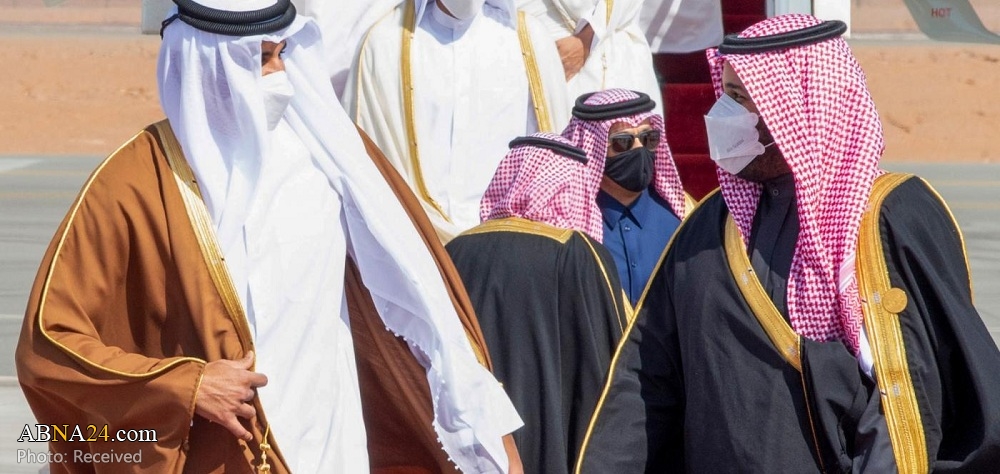AhlulBayt News Agency (ABNA): The 41st (Persian) Gulf Cooperation Council summit was held on Tuesday in the Saudi Arabian city of Alula, coming on the heels of Kuwait’s announcement on Monday that Saudi Arabia is going to lift the maritime, land, and air blockade on Qatar. At the end of the meeting whose main theme was the end of the three-year crisis between the Saudi-led camp and Qatar.
Although the terms of the statement were not published, Kuwait’s Emir Sheikh Nawaf Al-Ahmad Al-Sabah said that it contained a permanent agreement of solidarity and unity.
Based on what has so far leaked, the three countries of Saudi Arabia, the UAE, and Bahrain will end their all-out embargo on Qatar and reopen their borders with it and in return, Doha will suspend its lawsuits against the three countries with the international organizations.
Still, the depth of the crisis between the two sides, the level of participation of the leaders, and some other issues promote some questions: Has the reconciliation agreement managed to end the crisis in the Arab bloc? Will the bloc break with a stagnation it has been grappling with for years once ties are mended?
Lack of coordination and shared views of the participating states
Despite holding the summit and signing the closing statement by all member states, the blockading states seem to be divided over the mechanism of settling the crisis. Specifically, Egypt, the UAE, and Bahrain still keep their preconditions for rapprochement, though not mentioned in the statement. Qatar’s decline to offer guarantees that it will no longer support the Muslim Brotherhood in Egypt and other Arab countries caused President Abdel Fattah el-Sisi of Egypt to skip the meeting despite an invitation from the Saudi King Salman bin Abdulaziz. In the final hours, Foreign Minister Sameh Shoukry was announced representing Cairo at the meeting.
Bahrain, which participated at the level of the crown prince, also sent a clear message of not being in full compliance with Saudi Arabia when it comes to Qatar's case.
The UAE has sent Abu Dhabi Crown Prince Mohammed bin Zayed as the highest-ranking participant representing the country at the summit in the past 10 years but evidence shows that the crown prince as the de facto ruler of the Emirates is not contented with the way Qatar case is resolved.
All these lead to the notion that crisis with the blockaders will remain in place at important and unavoidable levels.
An imposed statement and lasting grudge
One important point about Alula's statement is its being an imposed one. In other words, despite Kuwaiti, and occasionally Omani, efforts to bridge the gaps, there were no signs of moving towards the reconciliation and the efforts were more a result of the US pressures than an Arab and domestic decision. Qatar’s categorical rejection of the 13 preconditions set by the four countries and decline to implement even a single one of them made the case somehow a prestige issue for them, especially Saudi Arabia and thus the crisis was far from an easy solution as Doha stood firm on its stances.
Besides, it should be taken into account that the previous Cooperation Council summit, held with the presence of the Qatari prime minister to prepare the ground for mending the ties, lasted only 30 minutes, signaling a lack of shared viewpoints and also serious resolve by the anti-Qatari front to settle the crisis.
Mujtahid, a Twitter activist and royal affairs whistle-blower, in a tweet said: “It was Trump, not Kuwait, who concluded the reconciliation, forcing bin Salman to unwillingly reopen airspace and borders to Qatar. He also forced Tamim to go to Saudi Arabia against his free will. He also recommended bin Zayed not to object to Saudi Arabia.”
“Bin Salman will keep his hatred for the Qataris despite showing affection. Bin Zayed will keep his hatred for the Qataris despite showing no objection to the Saudis. The Qataris will continue to look with suspicion at bin Salman and at bin Zayed with hostility. If there would be no war, nobody will prevent the re-imposition of the blockade but Biden, if he assumes [power]. Even worse, the MbS and MbZ will carry out a more dangerous plot than the siege,” Mujtahid tweeted using Mohammed bin Salman and Mohammed bin Zayed acronyms.
Alula's meeting was held with the signing of a statement and not an agreement, while three of the four sanctioning countries had their own serious considerations to the case and accepted the apparently foisted statement with reluctance.
From another aspect, the Saudi grudge against Qatar and the feeling of defeat in a-matter-of-prestige game against Doha make the rapprochement largely fragile. On the other hand, the Qatari distrust in the opposite side and its concerns about a repeat of the 2017 occurrences all impose a heavy shadow of doubt on the détente and its fate. The conclusion is that the reconciliation is way far from being able to solve the crisis and thus cannot restore the (P) GCC from its comma.
/129

